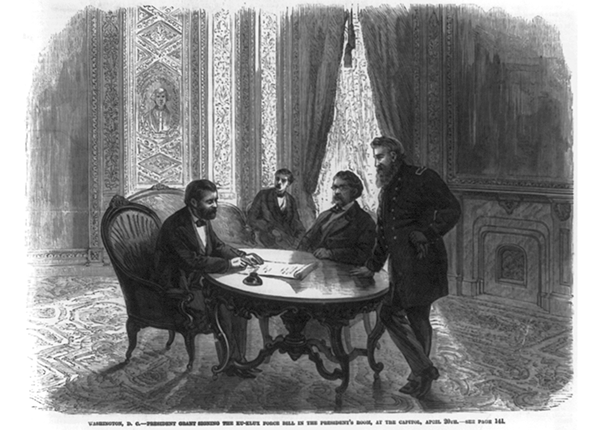Historic Document
Ku Klux Klan Act of 1871, “An Act to enforce the Provisions of the Fourteenth Amendment to the Constitution of the United States, and for other Purposes”
Congress | April 20, 1871

Library of Congress, Prints and Photographs Division
Summary
In December 1865, at nearly the same time the Thirteenth Amendment abolished slavery nationwide, a group of former Confederates formed a self-proclaimed “self-defense” organization—the Ku Klux Klan. Former General Nathan Bedford Forrest served as its first “Grand Dragon” and from 1866 onward Klansmen engaged in a campaign of terrorist violence against African Americans, Unionists, loyal state government agents, and federal officers in the South. Introduced by Representative Samuel Shellabarger of Ohio, the KKK Act –officially known as an “Act to enforce the Provisions of the Fourteenth Amendment to the Constitution of the United States, and for other Purposes”—was the third of a set increasingly detailed efforts to curb the violence and protect African Americans and Reconstruction authorities and allies in the South. The modern version of the KKK Act, 42 U.S.C. § 1983, is one of the primary means of vindicating federal constitutional rights against state and local actors even today.
Selected by

Allen C. Guelzo
Director, Initiative on Politics and Statesmanship, James Madison Program in American Ideals and Institutions, Princeton University

Darrell A.H. Miller
Melvin G. Shimm Professor of Law at Duke University School of Law
Document Excerpt
Be it enacted…That any person who, under color of any law, statute, ordinance, regulation, custom, or usage of any State, shall subject, or cause to be subjected any person within the jurisdiction of the United States to the deprivation of any rights, privileges, or immunities secured by the Constitution of the United States, shall, any such law, statute, ordinance, regulation, custom or usage of the State to the contrary notwithstanding, be liable to the party injured in any action at law, suit in equity, or other proper proceeding for redress….
Sec. 2. That if two or more persons within any State or Territory of the United States shall conspire together to overthrow, or to put down, or to destroy by force the government of the United States…or by force, intimidation, or threat to prevent any person from accepting or holding any office or trust or place of confidence under the United States, or from discharging the duties thereof…or to injure him in his person or property on account of his lawful discharge of the duties of his office, or to injure his person while engaged in the lawful discharge of the duties of his office…or by force, intimidation, or threat to deter any party or witness in any court of the United States from attending such court…or shall conspire together for the purpose in any manner impeding, hindering, obstructing or defeating the due course of justice in any State or Territory, with intent to deny to any citizen of the United States the due and equal protection of the laws…or threat to prevent any citizen of the United States lawfully entitled to vote from giving his support or advocacy in a lawful manner towards or in favor of the election of any lawfully qualified person as an elector of President or Vice-President of the United States, or as a member of the Congress of the United States, or to injure any such citizen in his person or property on account of such support or advocacy, each and every person so offending shall be deemed guilty of a high crime….
Sec. 3. That in all cases where insurrection, domestic violence, unlawful combinations, or conspiracies in any State shall so obstruct or hinder the execution of the laws thereof, and of the United States, as to deprive any portion or class of the people of such State of any of the rights, privileges, or immunities, or protection, named in the Constitution and secured by this act, and the constituted authorities of such State shall either be unable to protect, or shall, from any cause, fail in or refuse protection of the people in such rights, such facts shall be deemed a denial by such State of the equal protection of the laws to which they are entitled under the Constitution of the United States; and in all such cases…it shall be lawful for the President, and it shall be his duty to take such measures, by the employment of the militia or the land and naval forces of the United States, or of either, or by other means, as he may deem necessary for the suppressions of such insurrection, domestic violence, or combinations….
Sec. 6. That any person or persons, having knowledge that any of the wrongs conspired to be done and mentioned in the second section of this act are about to be committed, and having power to prevent or aid in preventing the same, shall neglect or refuse to do so, and such wrongful act shall be committed, such person or persons shall be liable to the person injured . . . for all damages caused by any such wrongful act which such first-named person or persons by reasonable diligence, could have prevented . . .



